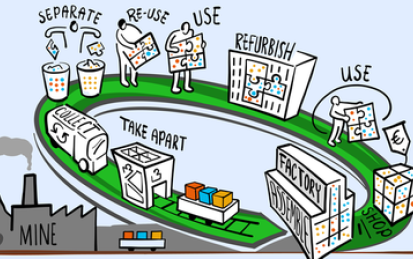

Our Courses

The Econometrics of Time Series Data
In this course, you will look at models and approaches that are designed to deal with challenges raised by time series data. The discussion covers the motivation for the use of particular models and the description of the characteristics of time series data, with a special attention raised to the potential memory. You will: – Discuss time series models, that refer to data that have been collected over a period on one or more variables for the same individual.
-
Course by

-
 Self Paced
Self Paced
-
 31 hours
31 hours
-
 English
English

Introduction to Energy Management Powered by RETScreen
The objective of this MOOC is to help organizations combat climate change through effective energy management. It explains proven strategies to reduce greenhouse gases and encourage the transition to a low carbon economy. It also provides an introduction to RETScreen Expert – the world’s leading software to empower cleaner energy decisions.
With practical examples and applications, learn how to make the management of energy more efficient, cleaner and more sustainable.
-
Course by

-
 Self Paced
Self Paced
-
 English
English

Circular Strategies for Hospitals
Learn to apply the principles of the circular economy in a hospital or healthcare organization to reduce waste and contribute to sustainable healthcare.
-
Course by

-
 Self Paced
Self Paced
-
 23
23
-
 English
English

Designing Electronics for Recycling in a Circular Economy
Discover the latest developments in Design for Recycling (DfR) of electrical and electronic equipment (EEE) and the application of recycled plastics into new products.
-
Course by

-
 Self Paced
Self Paced
-
 63
63
-
 English
English

The Transition to the Decarbonised Economy of Tomorrow
Dive into the economic strategies for promoting the energy transition: technologies, policies, pricing, emission trading and more.
-
Course by

-
 Self Paced
Self Paced
-
 30
30
-
 English
English

Engineering Design for a Circular Economy
Discover and develop sustainable design and engineering methods to improve the reuse, repair, remanufacturing, and recycling of products for a circular economy.
-
Course by

-
 Self Paced
Self Paced
-
 25
25
-
 English
English

Waste Management and Critical Raw Materials
Learn about waste management and its key role in saving critical raw materials. Gain practical knowledge of the circular economy, recycling, refurbishment, and remanufacturing as a means of identifying new business opportunities.
-
Course by

-
 Self Paced
Self Paced
-
 60
60
-
 English
English

New Space Economy
The New Space Economy is a fast-growing market, driven by the commercialization of the historical institutional space sector. This course contains more than 30 videos-lectures from space experts from various fields.
-
Course by

-
 Self Paced
Self Paced
-
 13
13
-
 English
English

Macroeconomics for a Sustainable Planet
Is it possible to develop a thriving global economy in an equitable and environmentally-resilient way?
-
Course by

-
 Self Paced
Self Paced
-
 24
24
-
 English
English

Circular Economy: An Interdisciplinary Approach
Join the transition towards a circular economy considering economic, supply chain, social, technical, managerial and environmental aspects.
-
Course by

-
 Self Paced
Self Paced
-
 24
24
-
 English
English

Economics and Policies in a Biobased Economy
Lead your company to make the switch to biobased resources and build a profitable sustainable business. Learn how to deal with the economics and policies governing this transition and the implementation and learn how to measure the outcome.
-
Course by

-
 Self Paced
Self Paced
-
 35
35
-
 English
English

Business Strategy and Operations in a Biobased Economy
Lead your company to make the switch to biobased resources and build a profitable sustainable business. Learn how to deal with the many strategic and operational challenges facing a companyin the biobased and circular economy.
-
Course by

-
 Self Paced
Self Paced
-
 36
36
-
 English
English

From Fossil Resources to Biomass: A Business and Economics Perspective
Learn about the basic consumer science, business, logistics, supply chain, and economic principles that are essential for a successful transition from fossil resources to renewable biomass resources in a biobased economy.
-
Course by

-
 Self Paced
Self Paced
-
 18
18
-
 English
English

Property Law in a Globalizing Economy: Diversity or Integration?
Explore international diversity of conveyance rules applicable to several transactions, including highly globalized ones, by comparing American law, German law, and Japanese law. Learn the approaches, to what extent, and how international harmonization should be achieved to take part in such an open-ended discussion in the future.
-
Course by

-
 Self Paced
Self Paced
-
 39
39
-
 English
English

Circular Economy: An Introduction
Ready to make a difference? Learn how to contribute to a sustainable economic system by implementing novel business and design approaches!
-
Course by

-
 Self Paced
Self Paced
-
 14
14
-
 English
English

Capstone Business and Operations for a Circular Bio-Economy
This capstone project is the final part of the MicroMasters® Program Business and Operations for a Circular Bio-Economy. Interdisciplinarity is central in this part, linking the various sections in this MicroMasters Program.
-
Course by

-
 Self Paced
Self Paced
-
 English
English

Capstone Economics and Policies for a Circular Economy
This capstone project is the final part of the MicroMasters® Program Economics and Policies for a Circular Economy. Interdisciplinarity is central in this part, linking the various sections in this MicroMasters Program.
-
Course by

-
 Self Paced
Self Paced
-
 English
English

Earth Economics
After this course you will be an Earth Economist that can provide evidence-based advise on the best global policy. As an Earth Economist you will better understand the behavior and advice of economists, have become a better economist yourself and know where to find Earth's data and how to analyze these world observations. Our planet is too important: we need you to get engaged! Earth Economics offers a completely new angle to policy analysis by its focus on the truly global level and its empirical orientation on very recent data.
-
Course by

-
 Self Paced
Self Paced
-
 21 hours
21 hours
-
 English
English

Taiwan Law in Focus: Economy, Society and Democracy
“Taiwan Law in Focus” is the first online course provided by the College of Law, National Taiwan University. This course will give you an introduction to the legal system in Taiwan, which includes the topics of Constitution, administration law, criminal law, civil law, corporative law, and some related issues. You will learn about the brief history of Taiwan’s legal system and its transition in recent decades. Each week we will focus on different aspects of Taiwan’s legal system. Video lectures and some discussions are included to enable you to learn about the key issues.
-
Course by

-
 Self Paced
Self Paced
-
 17 hours
17 hours
-
 English
English

Trade & investment: evidence-based policies for development
This MOOC prepares students that want to analyse trade and investment policies of developing countries and emerging markets. We couch you for the task of giving evidence-based policy. For students interested in policy advise the course brings a sound understanding of what can and what cannot be done with well-established theories and state-of-the-art research.
-
Course by

-
 Self Paced
Self Paced
-
 English
English

Global Strategy II: Doing Business in The Global Economy
This course explores the ways firms overcome challenges when operating globally – a process characterized for its complexity and uncertainty. Corporations trying to succeed in the global economy need to develop different types of strategies depending on where they are conducting business or industry they are in. You will be able to: • -Determine the best strategy to follow when expanding globally • -Analyze the advantages and disadvantages of those strategies • -Develop appropriate responses to external pressures.
-
Course by

-
 Self Paced
Self Paced
-
 11 hours
11 hours
-
 English
English

Global Financing Solutions (by EDHEC and Société Générale)
The MOOC Global Financing Solutions is your online gateway to better understanding of the dynamics of Finance, and its role at the very heart of promoting the “real economy” and global growth. Concretely, you will learn how companies finance themselves using banks and capital markets and how Environmental, Social and Corporate Governance criteria are now deeply integrated in all financing processes. We will look at the role of syndication, and how it links issuers looking to raise capital to grow their businesses with investors looking to manage their assets and possibly liabilities.
-
Course by

-
 Self Paced
Self Paced
-
 English
English

ChatGPT Teach-Out
This Teach-Out introduces learners to artificial intelligence and explains how large language models and chatbots like ChatGPT work. You will better understand the ethical use of artificial intelligence, the implications of authorship, and how tools like ChatGPT might be utilized and regulated moving forward. ChatGPT launched in November 2022 in an effort to enhance natural language processing tasks like translation, text summarization, and text generation. Within five days of release, ChatGPT crossed 1 million users.
-
Course by

-
 Self Paced
Self Paced
-
 6 hours
6 hours
-
 English
English

Inclusive Analytic Techniques
Many policies, products, services or processes that we think of as gender-neutral actually have gendered outcomes. Everything from snow plowing to car safety to investment advising to infrastructure investment has impacts that differ by gender. These outcomes can be even more biased if we look at important intersections with race, indigeneity, differences in ability, ethnicity, sexual orientation, and other identities. The question is, what can you do to change this?
-
Course by

-
 Self Paced
Self Paced
-
 8 hours
8 hours
-
 English
English

Technology Strategy: Creative Destruction
The success of modern companies depends critically on their ability to manage and respond to technological change. Innovation is continually challenging companies’ competitive advantages, giving rise to new business models, and stimulating new platform-based competition. Managers and entrepreneurs need to understand these strategic forces and how they impact firms and industries in the modern knowledge economy.
-
Course by

-
 Self Paced
Self Paced
-
 12 hours
12 hours
-
 English
English



